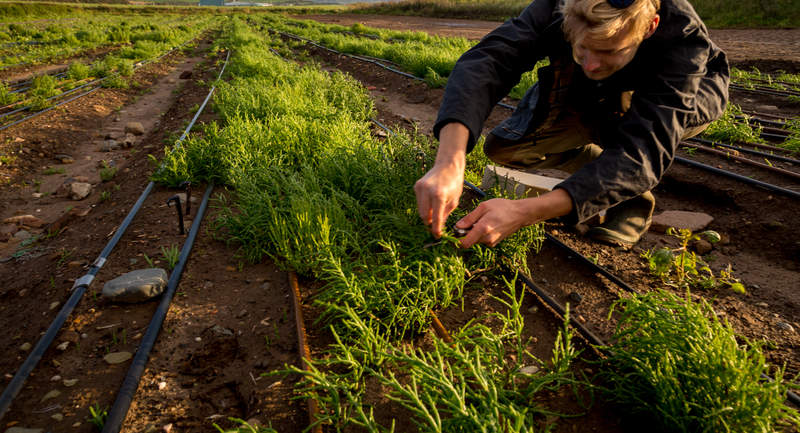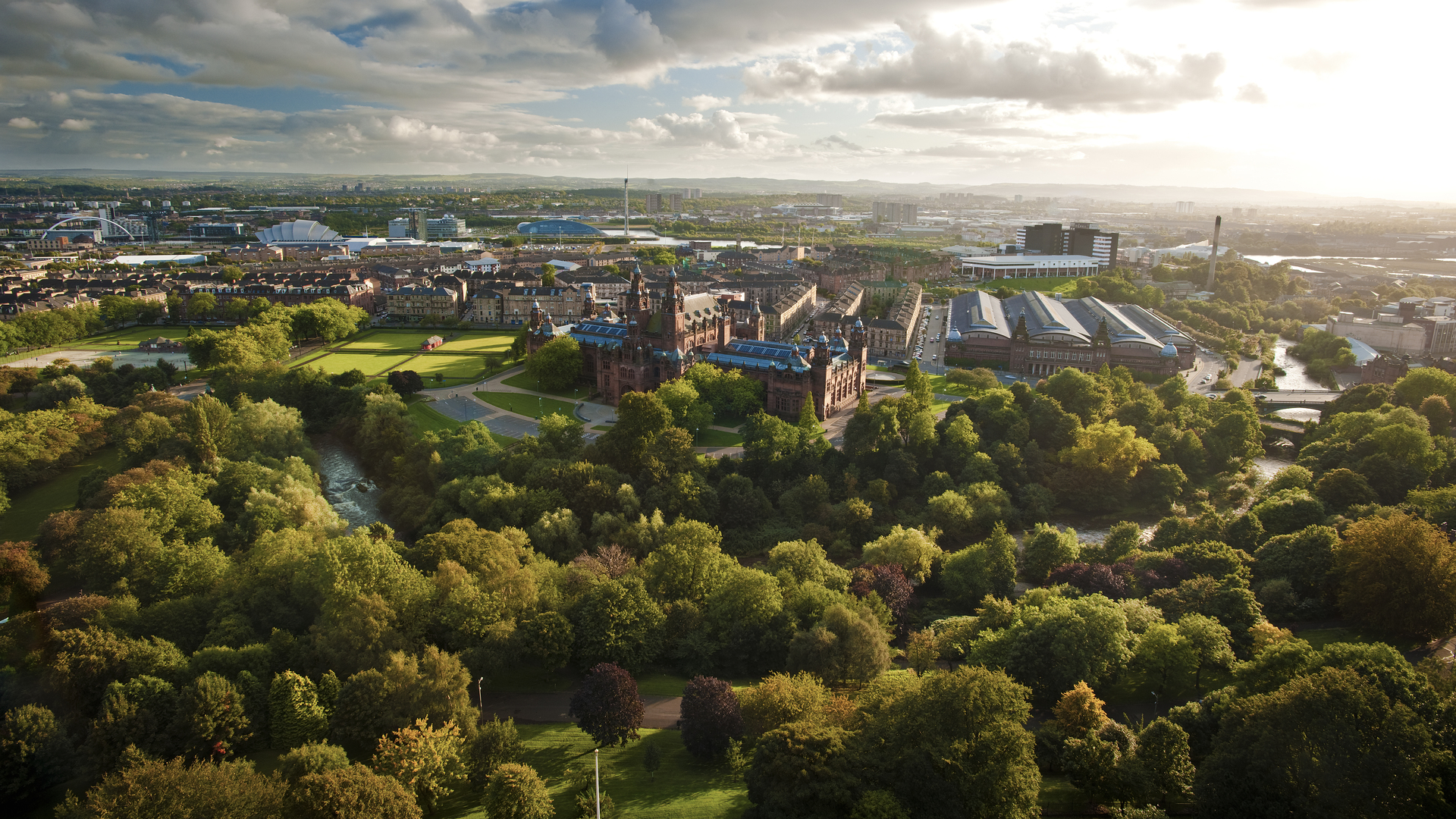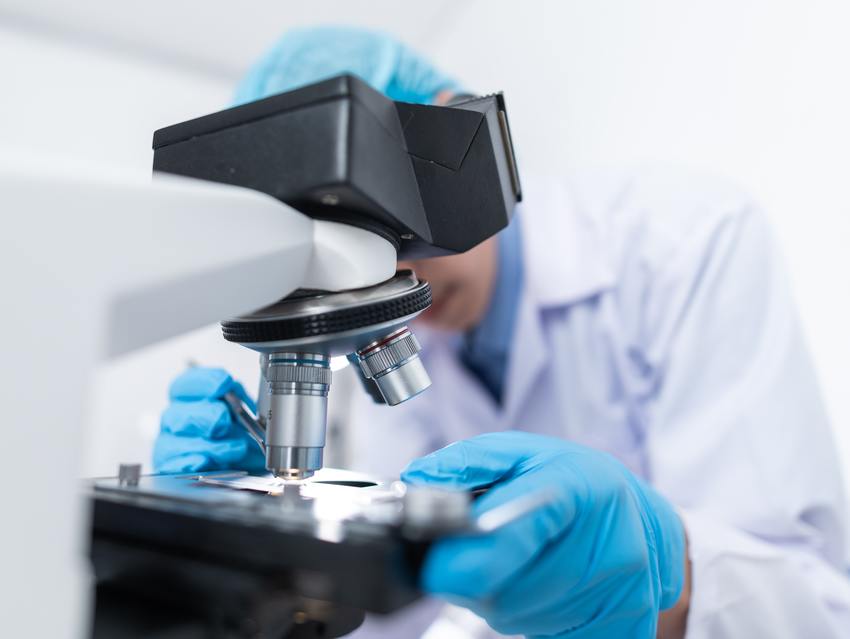Glasgow’s early adoption of sustainable policy in various industries, and its leadership on climate and environmental agendas, has firmly established it as a city that wears its green credentials on its sleeve.
As proud host of the UN Climate Change Conference (COP26), Glasgow has set out its stall to become the city of our times for the challenge of our times.
As part of its COP26 legacy, Glasgow will join the C40 Thriving Cities Initiative, a 2-year pilot project for pioneering cities that recognise the need to tackle harmful, unsustainable consumption and transition to more equitable and sustainable economies to meet Paris Climate Agreement goals.
As an early mover in this space, Glasgow can claim several UK and European “firsts” ...
First city outside of London…
to introduce a low-emission zone.
First city to introduce…
an electric bus fleet to its airport car parks.
First European convention bureau…
to receive a Green Tourism award.
Glasgow’s climate credentials are very strong, even by European standards, and are set to grow even further as a result of huge investment in the region’s Green Network.
It is predicted that there will be £1.5bn of new investments in low-carbon and renewable energy fields in Glasgow in the next 10 years.
With Glasgow setting the ambitious target of becoming a carbon neutral city by 2030, we are prioritising the innovation and ingenuity that will set the pace for a cleaner, greener, net zero future.
From green energy and climate justice to tackling air pollution, explore stories of the city region's world-leading research, innovation and entrepreneurship here.

Image credit: Seawater Solutions Ltd
Glasgow’s transition to a green economy will focus on green technology, creating sustainable industry and transport and cutting pollution. Turning climate and environmental challenges into opportunities will make the transition just and inclusive for all, which for the Glasgow City Regional population is vital.
Explore the ongoing projects that make Glasgow a world centre for sustainable policy, innovation and action here.
Glasgow has pledged ...
to become the UK’s first Net Zero carbon city by 2030.
The Glasgow region has over 12,000 renewable energy sites producing nearly 4,000,000MWh of energy annually – more than any other UK city.
Climate Tech is a global market with huge growth potential. Globally, billions of pounds of investment is being directed into this nascent sector as demand snowballs for solutions to net zero challenges. This represents a major strategic opportunity for the Scottish economy.
Climate Tech is vital for the future of our economy and our planet. Growing Glasgow’s Climate Tech sector will be essential to deliver a just transition to Glasgow’s ambitious target to become a Net Zero Carbon City by 2030 which in turn will create green jobs, boost exports, innovation and productivity and support global economic and environmental prosperity.
Investment in Scotland’s Climate Tech sector…
grew by 35% in 2020.
Current projections suggest…
it could hit £123m by 2025.
Glasgow has become…
the UK’s first city to achieve EarthCheck Benchmarked Community status
Our city has long been a leader in life sciences, engineering, science, and technology research and as the city hosted COP26, it celebrated being awarded EarthCheck Benchmarked Community status - confirming the city's vision to develop a strong circular and regenerative economy.
This benchmarking achievement marked a significant step for Glasgow to become one of the world's most sustainable and resilient places to live, visit and do business.
Read more about what this means for the city.
Regional Strengths
Glasgow City Region is undertaking widespread transformation to both adapt to and mitigate against climate change.
The Glasgow Green Deal is a nine-year mission which will fundamentally reshape the city's economy. It is a transformative new approach, designed to bridge the gap between aspirations and action around the Climate and Ecological Emergencies and deliver equitable, Net Zero carbon, climate resilient living by 2030.
The Green Deal roadmap builds on many projects and activities already underway in the City, such as the Housing Retrofit Programme, the Glasgow Metro, the Climate Neutral Innovation District, and the Clyde Climate Forest - and complements them with a strong focus on systems innovation.
These projects are captured in the regional Greenprint for Investment prospectus, which will collectively contribute to the City achieving its Net Zero by 2030 targets and will require unprecedented levels of both public and especially private sector investment over the long term.
Glasgow has met and exceeded ...
its 30% reduction target five years ahead of schedule (achieved in 2015 against a target of 2020).
District heating schemes have been piloted in the city on a smaller scale, to better understand the role district heating will play in reaching carbon neutrality. An aggressive plastics reduction strategy has been committed to, which positions Glasgow to be single-use plastic-free by 2022.
Furthermore, the city has launched a Circular Economy Routemap, setting out how it can achieve economic circularity by 2045. Additional strategies under development include the use of vacant or derelict land for either renewable energy generation or local food growing.
Circular Glasgow, an initiative of Glasgow Chamber of Commerce, working alongside key partners Zero Waste Scotland and Glasgow City Council, offers businesses a powerful proposition to help lead the way through innovation, design thinking and new circular business models.
Beyond the boundaries of the city administration, the Sustainable Glasgow partnership has been established, which brings together stakeholders from various sectors across the city that can bring about change and support the transition towards a low-carbon future, with a just transition being the fulcrum around which this transition is delivered.
Work is happening across the region to build collective resilience to the impacts of climate change. Climate Ready Clyde, the City Region’s partnership initiative on adaptation, has developed the Glasgow City Region Adaptation Strategy and Action Plan, to build the resilience of the city region to climate change. The strategy commits to:
- Protecting 140,000 of the most vulnerable citizens from the impacts of climate change.
- Mobilising an additional £185m a year to close the adaptation gap and resilience.
- Securing a further 125 organisations to build the region’s climate resilience.
The strategy is an approach to keep Glasgow City Region as a great place to do business, helping it to flourish in the future climate.
Cluster Strengths
Glasgow has key strengths in the enabling technologies (data analysis, software, sensors and power electronics) to manage the shift to smart, flexible local energy networks that can match power supply and demand.
Decarbonising heating and cooling could make a significant contribution to Glasgow’s net zero ambitions. From 2024 all new homes built in Scotland (from 2025 elsewhere in the UK) must use renewable or low-carbon heating, which will create significant demand for heat pumps and therefore the opportunity to attract inward investment from leading international heat pump manufacturers and their supply chains.
£10.5m funding package to purchase…
19 hydrogen-powered refuse collection vehicles. As a result, Glasgow will become home to the largest fleet of hydrogen powered bin lorries in the world.
Glasgow City Council also seeks to create…
a fleet of zero emission vehicles by the end of 2029.
More than 100 new electric cars…
are already in use and work is ongoing to convert up to 20 smaller lorries to dual fuel hydrogen.
Assets and Infrastructure
Power Network Demonstration Centre
The Power Network Demonstration Centre in Glasgow is a key asset in developing innovative solutions for energy systems.
Offshore Renewable Energy Catapult
The Offshore Renewable Energy Catapult (OREC) is a key Glasgow-based technology organisation, well connected not only in the UK but in many countries globally and provides a unique offering for many companies in addressing the energy transition and developing or deploying new technology.
Project PACE
Project PACE, a partnership between North and South Lanarkshire local authorities and energy network operators on the development and innovative management of electric vehicle charging networks.
Driving the Electric Revolution centre of excellence
The Driving the Electric Revolution centre of excellence at the University of Strathclyde, linked to the Power Networks Demonstration Centre and the National Manufacturing Institute for Scotland.
Glasgow Geoenergy Observatory
The Glasgow Geoenergy Observatory (Glasgow Geothermal Energy Field Research Site) is the only facility of its kind in the world. The project, and related projects around it, will help not only understand the potential for geothermal heat but also provide a platform to develop demonstrations.
Climate Neutral Innovation District
As part of the development of Glasgow City Innovation District, the University of Strathclyde is leading an ambitious project to a 100% renewable climate neutral and climate resilient area within the district. The project aims to integrate heat, power, transport, climate adaptation and wellbeing solutions that will benefit everyone in the area of the Innovation District.
Networks
Sustainability at Glasgow
The University of Glasgow is the first UK university to declare it would divest from fossil fuels within a decade. Find out more about Sustainability at Glasgow.
Centre for Sustainable Development
The University of Strathclyde's Centre for Sustainable Development is a university-wide resource designed to create an integrated and equitable approach to teaching, research, and innovation.
Glasgow and Clyde Valley Green Network
The Glasgow City Region (Glasgow and Clyde Valley) GCV Green Network provides well-connected, high quality, multi-functional greenspaces throughout the region. From cycle paths to allotments, wildlife habitats to urban rain gardens.
Glasgow Community Food Network
The Glasgow Community Food Network was established in 2017 to bring together practitioners and organisations in the private, public and third sectors along with other interested individuals to develop a flourishing food system in Glasgow.
Industry Support
Sustainable Glasgow is a partnership which aims to position Glasgow as a leading city in the development of the green and wider circular economy.
Circular Glasgow is an initiative of Glasgow Chamber of Commerce, working alongside key partners Zero Waste Scotland and Glasgow City Council. It offers businesses, no matter the size, a powerful proposition to help lead the way through innovation, design thinking and new circular business models.
Sustainable Scotland is Scotland’s public sector network on sustainability and climate change. They support over 600 members across public bodies in Scotland on their journey to net zero.
Ecosystem
Glasgow is home to a growing ecosystem of Climate Tech businesses, organisations and partnerships across the public, private and third sectors.
Engagement with businesses and start-ups suggests that Glasgow has major strengths in Climate Tech in the Built Environment, Use of Satellite Technology and in Waste & Circular Economy due to expertise in data analytics, as well as major opportunities at a broader national level in Agriculture and Land Use, Land Use Change & Forestry due to our natural capital assets.
From harnessing the power of AI and blockchain to eliminating food waste or improving energy efficiency, to using data analytics and the Internet of Things to enhancing biodiversity or monitoring pollution, Glasgow-based entrepreneurs, innovators and researchers are delivering affordable, effective and scalable solutions to the challenges of achieving net zero.
Company Focus
Built Environment
Enterprise Software
Food & Drink
Energy
- Star Renewable Energy
- Enocell
- Connex Solar
- Katrick Technologies
- Renewable Dynamics
- Logic Energy
- Flex Marine Power
- Elimpus
- Argyll Energy
- Wind Farm Analytics
- Argent Energy
Travel
Apparel & Home Living
- LAW Design Studios
- ACS Clothing
- ApparelXchange
- Save Your Wardrobe
- Beauty Kitchen
- EGG Lighting
- Sofa For Life
- Undisturbed
Packaging & Waste Management
Earth Observation
Other (Healthtech, Sensor Tech)
Talent Pipeline/ Key Skills
The Green Jobs Workforce Academy can help people take a greener approach to their careers, from accessing training and learning new skills to finding a new job and will help ensure Scotland’s workforce has the skills it needs to reach net zero carbon emissions by 2045.
The Energy Skills Partnership supports colleges in curriculum development and delivery in new and emerging technologies in areas such as low carbon transport, energy efficiency and advanced manufacturing by ensuring that colleges deliver the skills for a green economy.
The University of Glasgow offers a BSc (Hons) in Environmental Science and Sustainability and a MSc in Environment and Sustainable Development.
The University of Strathclyde offers a MSc in Sustainability and Environmental Studies and a MBA in Sustainable Energy Futures.
Glasgow Caledonian University offers a MSc in Climate Justice.




